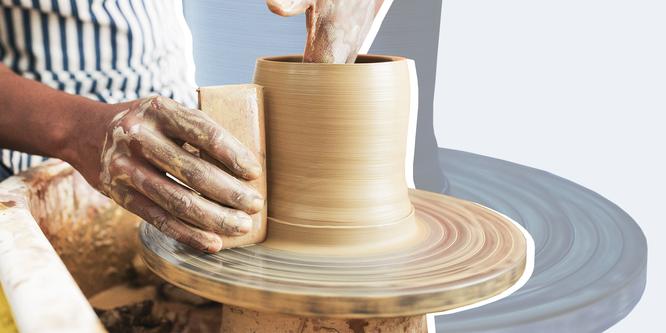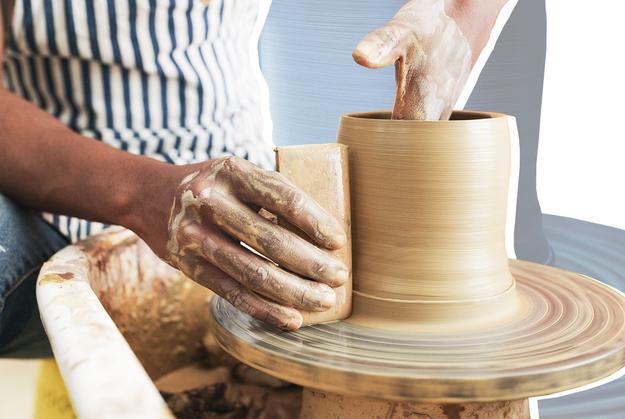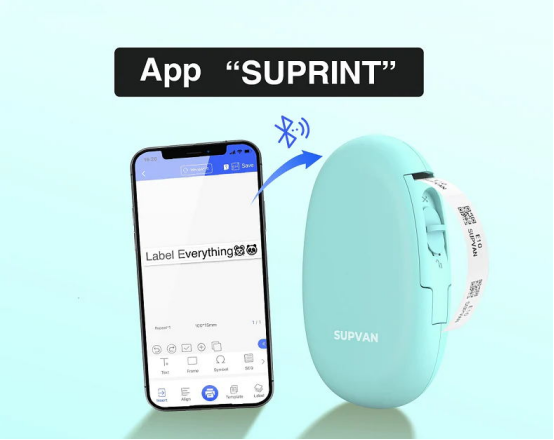
By cuterose
Urgent, Necessary, Vital
The Machinist comes at night, out of the iron dark. Cold hands, rough, but no dirt under the nails, no grease. The first taste of him is electric.
On the porch, The Machinist smokes and watches the snow descend sideways through the streetlights. The cedar tree in the front yard sickles around the powerlines. Dead spindles glow in the blue light. Across the street, the bank quietly advertises its 24-hr ATM like someone in want of attention. The Machinist’s neck and chest have gone red. It is an absurd thing, to be smoking in the cold in just a flannel and his long underwear, but the absurdity somehow is endearing. The Machinist turns, smiles. His eyes flicker brighter and then darken.
In the morning, The Machinist gets on his boots and tucks the front of his flannel down into his jeans. He circles his fingers around the waistband, getting it all in. Bit of a belly. His breath puffs white in the room. There’s a soft, purple bruise under his eye that looks like a painting of a dark sky. His clothes smell like smoke, but he’s fresh and damp from the shower. His hair is dark now, flicks when he tosses his head back in some joke.
The Machinist leaves, tossing a wave over his shoulder. His truck is parked around the corner, and he’s going to be late to work if he does not hurry. He drank the last of the coffee from last night, heated up fast in the microwave, bouncing from foot to foot like an impatient child. He left the cup in the sink.
He dropped the condom in the waste basket by the bed last night after he’d pulled out the second time. The trash needs to be taken out. But for now, there is the deep, bright clean of morning. For now, there is more coffee to make and breakfast to find. The smoke is in the sheets.
The studio is quiet.
Seven tables, one at the front, the other six in paired rows spaced evenly apart. Mounds of grayish clay from the pottery class the evening before. Martine, one of the other pottery students, never clears away after herself or her students—the middle-aged and the quarter-aged who come by way of Craigslist, by way of fliers left in cafes across town, by way of word of mouth down at the rec center. Martine is such a gifted teacher. Martine is so patient. Martine is so good.
Martine, from South Dakota and who sounds, at times, vaguely Canadian, teaches a beginner pottery class in what they call the little studio because it is smaller than the big studio, where the pottery students learn to throw and shape and mold and tear apart each other’s work. Martine is tall and broad-shouldered with strong hands. One feels, if not at ease in her presence, then at least calm, capable of aspiration to bettering oneself.
Teaching pottery is not dissimilar from self-help. No one signs up for a pottery class from Craigslist hoping to actually get better at pottery. They come seeking refuge from their lives: their boyfriends, their girlfriends, their husbands, their jobs, their graduate school, their children, their lack of children, their pets, their dying parents, their ailing grandparents, their student loans. Martine guides them, showing them how to center. How to get the wheel going. How to measure the clay. They spend a couple of weeks just handling the clay. On dry land, Martine calls it. On their tables, they work and shape, practice the wedge, the ball. Those primordial shapes you must master before moving on to what Martine calls wet lab. The wheel. Turning.
The TA office is on the second floor, nestled down a dank hallway that feels like a gymnasium. The radiator right by the door issues steam that smells like wet copper. The office looks out over the industrial park and the river, and in the evening, when the sky goes neon with gold light, and the tufts of smoke from the stacks hover close to the earth, it’s like living in a Rococo dream before it all drains away and night comes swiftly, definitively. In the winter, there are so few hours of daylight, and the office, with its tiny window fills slowly with warmth and light, and it’s not until around two in the afternoon that it’s fully illuminated, but there is something about the quality of light in that cramped office, something indirect and diffuse which makes it comforting.
Pytor is making coffee in the TA office. He sits on a small stool in the corner taking off his boots. He has wheat-colored hair, is going slightly bald at the temples, and a thick, russet-colored beard. His shucks his wet socks from his feet and lays them across the radiator to dry. He takes a second roll of gray socks from his jacket pocket, shakes them loose and slides them on, and then a pair of tan moccasins. The room fills with the smell of damp wool and the copper odor from the radiator. Snow strikes the glass softly, insistently, and the river, sluggish because it is partially frozen, glides along in a pewter stream out and away toward the industrial park.
Pytor drops his boots under his small table in the corner and stands, stretches out his back. His black sweater rises a little and there is a brief view of his belly, its fuzzy yellow hair. The sweater is dusty, with holes at the armpit. He drapes his gray apron over himself, checks the placement of his tools. Sips the coffee. Asks for help, as he always does, laughingly, in tying the apron. The straps are rough and have gone thin. The stitches holding them to the apron will have to be redone, a task that is simple enough, but Pytor is superstitious. He’d rather throw the whole thing out than do that. He likes the apron tied tight, secure, which is why the stitches have gone loose. He has gotten thicker in his years in the program. His belly firmer and more pronounced. When he arrived, he was skinny and light, almost fey, but he’s gone full lumberjack. He wears his masculinity uneasily, anxiously, like a bad habit, and he talks quietly in a voice so low and soft that it’s a challenge to hear him. And sometimes, people wonder if he’s putting on, if all that gentle patience were an act, a performance. But no, it is not a performance. Or perhaps it is. But it is also a way of surviving.
With his apron tied, he waves, says Thank you. Leaves with his coffee. The radiator rattles. His socks lay there in a pose of perfect vulnerability, and it’s almost too much to look at them there, how tender, soft, exposed. It’s like seeing someone naked when they don’t know they are being looked at.
The coffee is a little fruity, a little sooty. Oscar—wiry, black, photography concentration—pours the last of it into his cup. His glasses are smudged, his eyes bleary. Denim overshirt and cream turtleneck. His fingertips are a mess of smears and streaks, all burned off from developing fluid. Sometimes he jokes that he could commit the perfect crime, spreading his long fingers to demonstrate the lack of prints.
Oscar recently posted on social media about the blinding whitenessof the program and the school and the town. It’s like living in a zoo. People want to pet me. The post got passed around at a party and people took turns reading from it and being offended, being annoyed, being charmed by it. He’s so full of shit, Martine had said. It’s not like that here. People are good here.
The previous year, Oscar had won a semi-prestigious national prize for his photography. A series of shots in post-industrial towns. The factories. The men in the factories. Their hands, some missing fingers, some cut up or permanently stained black. He had toured the East Coast and the Midwest, sometimes sleeping with men who normally did not sleep with men, taking photos of their beds, their hollow chests, their bellies and their dicks nestled like worms in the fur of their pubic hair. There was a look of startled vulnerability, as though they hadn’t known they’d been photographed until it was too late to stop it. The photos were in black and white and in color. Some were quite revealing, like something that should have been kept private. One of the photos, a shot of a man in a truck, the light of early afternoon cutting through the trees, the cramped interior, the short distance between the subject and the lens. His eyes were deep and bright, his lips slightly parted, a look of something like desire or want. It was an image that portended something.
Oscar had called the project I WALK AMONG GIANTS. The citation for the award and several of the articles that had appeared about it in The New Republic, Salon, The New Yorker website, and ARTFORUM had called it necessary and vital and urgent. Black staff writers had called it boring but provocative. White staff writers had described it as a daring and brave examination of whiteness from the inside-out, a shatteringly tender portrait of the oft-mythologized white working class. It seemed that no one could really make up their minds about whether or not the project was even successful in artistic terms, but there had been a small segment about Oscar on CBS Sunday Morning that had caused social media to flare to life over how young he was, how handsome, and then Out Magazine had run a little feature on how Oscar’s project was unapologetically queer and fierce as fuck, and then a second cadre of black staff writers had taken to Twitter to talk about how it wasn’t often that young black creatives got the same outsized praise as mediocre white artists, and it was okay if the work was ultimately boring because it was reparations that a young black talent was overrated.
In the department, people had congratulated him to his face, but spoke in whispers about how boring the photos were. How dull the project, the idea, how inextricably connected to white supremacy it was, how stupid, how how how. A black man taking photos of white men in factories. A weird racial queer fantasia of white masculinity. Love yourself, Martine had said loudly, joking. Pytor had said nothing. There was, within the department, a current of resentment. There was a sense of trespass. That he had done something facile and been rewarded for it. Wasn’t there enough schmaltz in the world? Wasn’t there enough bullshit fakery without this nonsense social justice play-acting? Goddamn, goddamn. There was nothing worse you could do than be successful.
Today, Oscar sips the coffee, checks his mailbox. Looks for something, doesn’t find it, leaves. The office is empty again. The radiator rattles.
The clay is unforgiving. It is tough to make yield. It holds no shape. The day is a little over half-gone. The small studio is quiet but buzzes with activity. Pytor, Martine, Hector, and Olivia. They’re at their own wheels—Martine and Hector use an old-style kick wheel, Pytor and Olivia have electric, and it’s like one of those jokes about there being two kinds of people in the world.
The semester is drawing to a close. There are fall reviews due soon. The faculty will descend and judge like a flock of angry ancestors. And so, brows are furrowed, breaths held. Shapes emerge, change, fall apart, fail. In the hall, other voices. Undergraduates. Graduate students. People’s boots thudding, squeaking on snowmelt. Intrusive sounds, but somehow comforting in their randomness, their insistence, evidence of the world going. Flares from other lives.
Martine throws with a reckless abandon. Her whole body is a tool. Her compositions are almost musical. They sway and turn. She throws thin, far thinner than seems possible to accommodate the size of her pieces. She is an artist of scale. Pytor’s work is minimal. His pieces don’t erupt so much as they seem to have been carved by air and water. He’s been working on a set of jugs for the last three months. Long, bent jugs with tapered mouths. They seem, as far as pouring implements go, impractical, but they are beautiful. White, sturdy, like the bones of a whale. Hector makes plates into which he carves elaborate designs, faces, symbols of the sun, of life, of death. He prints his work with leaves he collects. It is less like sculpting or pottery and more like sketching. There is a loose, improvisational quality to his work, but he is wed to his form. He hasn’t thrown anything that isn’t a plate in the two years he has been in the program. It’s all plates and platters. Olivia makes pretty, frivolous things. She has an Etsy store and partners with aesthetic bloggers to show off her works. Whereas the departmental aesthetic skews toward authentic, real, earnest, Olivia glazes in pastel, soft colors, and she makes mugs and cups and bowls that are smooth, so smooth that it seems they were made in an industrial, mass setting. She is blonde and ferocious, and people say unkind things about her. They refer to her as a businesswoman. And There goes Fortune 500. Her evaluations are always middling. People say things like no soul and gift shop vibe. People say this is not an airport duty-free.Things people say when they are anxious about their own qualities.
Considering Olivia and Oscar is like entering another of those jokes about there being two kinds of people in the world. Successful artists and real artists. As though the thing they were all seeking all the time—recognition, validation, some modest compensation for the work, this work—were the very things that invalidated the practice of art itself. It was some dark and mysterious kink in the functioning of the world, some silly little mistake.
Here, watching the gray water run down into the void of the drain, it all seems rather pointless.
The river is full of ice and foam, dragged further up the shore. The underside of the rusted bridge is tagged with graffiti—streaks of yellow and silver and black—that seems somehow desperate, lonely. In the summer, bats sleep here, and it is not uncommon to step on their children, sick and blind, a soft pop as all their bones break underfoot. In the evening, they stream out and into the sky, calling to each other, ecstatic to be alive. But now their roosts are empty. There’s a stained mattress on the other side of the river. Impossible not to remember the old man who slept there through most of the summer. How he sometimes jerked off into the river, no matter who was watching. To not think of his body, slender and quite pale, how he’d strip and splash river water up onto himself, even if people were walking by, even if he was there in perfect view of the road above him. There he squatted on the gravel, lathering and rinsing.
The man is sometimes now in the café, and when he arrives, he brings a strong smell with him. He sweats profusely as he unpacks his cords and cables from plastic bags and rucksacks. He assembles a rig on the café tables and types for several hours. He gets up to smoke outside in the hard cold. He returns and orders coffee. Counts out pennies and dimes from a dark pouch he keeps strapped to his body. The man’s eyes sometimes lighten with recognition. Those weeks of the summer, passing him as he bathed, as he jerked off, as he lay on the mattress staring as if in mediation. His eyes lighten and then dim and the moment, like so many other moments, passes.

The gravel is stiff underfoot. On the other side of the bridge, the industrial park looms. There is another tunnel, tall and made of yellow stone. Here, too, the walls marked, with marker, with pencil. Drawings of people, crude, with their thoughts streaming out and above them. And, like with Pytor’s socks, it feels somehow too much to see them, like an intrusion. Their private thoughts on display for the whole world. A prickly heat at the back of the throat as if slapped or called out. The marker makes a chuffing sound when dragged against the stone, like a refusal, or an exhalation of ecstasy. The thought bubbles filled in and blacked out, sealed like an old well.
The sky is so close. The clouds cluster and spread—all that sun from the early morning, like a promise not fulfilled. The cold is biting. The porch whines, bows just a little. The screen door slams, but there’s a loose, rusty nail hooked out of it that the landlord was meant to fix weeks ago. It cuts through jacket and sweater and slices, not deeply, but enough to graze, and there are thoughts of tetanus, the shot that the doctor has been urging, but which has, like the landlord fixing the rusty nail, been delayed for reasons vague and unnecessary.
Life’s unruly urgencies.
Tonight, dinner is boiled okra and black-eyed peas. Thoughts of home rise, swift, insisting. Thoughts of home and the grandfather dead now many years, but not forgotten because he was a dear, tender man. His flannels. He’d wet nails with spit in the winter and drive them home with one swing of the hammer, and the wind chapped everything— the milky gray spread of the sky, the dark valleys where the berry bramble slumbered, the old dogs and their baying carried miles through the trees and across the dark strip of asphalt. The heartwood waiting next to the old heater. The world settling down for the night, and how, through the trees, the gold lights of homes burned. Boiled okra and blackeyed peas, then, because of the past’s impossible forward momentum, making return impossible.
Clay under the fingernails though there has been much washing, so much washing that palms and knuckles cracked on the cold walk home. More washing then, and when they are clear, more washing still.
Heat feels like a rebuke when bones have grown used to cold.
The food is good. It does its purpose. Summoning old ghosts, old smells, a reminder of that old life, abandoned now, given up. To make silly shapes out of clay for no real purpose. The sting of the cut from the rusty nail, and again, the stomach clenches with anxiety because what if Tetanus, what if something awful, what if death? Though there is now health insurance, this was not always the case, and fear is the hardest habit to break.
There is the possibility of scheduling an appointment, but there is the possibility that it is nothing and besides the Tetanus shot hurts, more than it should, and the hurt lasts for days, and there is nothing that cleaning a wound and letting it breathe won’t cure. This too, from the grandfather, who had once, when feeding chickens, been driven back and onto the bent and jagged end of a metal spike. It didn’t go in very deep, but it left a wound which swelled and clotted, emptied of puss and swelled again. He was in pain for a long time, wincing every so often, changing his shirts two, three times a day when it leaked through his clothes. But he did not go to the doctor because doctors were for rich people and white people and rich white people and he was none of those things. He did not go to the doctor, even when the fever began, when the chills came. He brewed a tea from cow manure. He drank it daily, with whiskey. He shot a deer and cut its heart out and made a stew from it. He prayed and he drank his tea. And soon, the wound closed, and all that was left was a puckered scar and some occasional tenderness. He had cut a piece of the buck’s antler off and carried it in his pocket like a charm. He’d touch it sometimes and would say nothing, just shake his head.
It wasn’t clear then, but it is clear now that the gesture had been one of gratitude. As if his life had been traded for the buck’s. The grandfather was a man who believed that a life was a thing that could be traded, that everything belonged to the currency of the world. It was an old belief. An old thought. When he died, it was not a surprise. The only surprise was that he had lived as long as he did. But it was a testament to belief. Not in God as it were, but in the old ways of the world. It was from that world that he had come and it was to that world that he had returned.
The deer, trussed up and hanging from the rusted old apparatus also used to lift engines for repair. Its body had been warm when the grandfather cut its heart out with a skill and patience that was at once beautiful and also horrifying. The toy-like squeaking of wedging loose the dark mound of the heart. The blood steamed as it ran into the bucket, at first in a fluid stream and then something like mud, plopping down, more solid than liquid. Then the offal. Which had been carefully removed and stored.
The okra and black-eyed peas feel like something alive. They are slimy and slick. Kernels and seeds. But they are good. Fortifying. Warm. Eaten on the porch in the cold, watching the sky drop and close. Last of the day draining out of the sky.
That line from a poem, To what would you lose a year of your life?
The answer is different for the buck and the grandfather. Life is somehow an intractable argument. Impossible to argue for or against, implicated by one’s position among the living.
The Machinist is full of apologies for being late. He is tired. He says that he’s in a shitty situation, but no, does not want to talk about it, which is fine. Except he obviously does want to talk about it and begins to do so. When he was nineteen, his mother’s friend asked him if she could go down on him. And he didn’t know how to say no, and so he’d said yes, but had wanted to quit almost right away, and it had made him uneasy and unhappy and he hadn’t even gotten hard, but the mother’s friend had kept at him, and she’d stared and performed and put on a show, and in the end, he’d pulled himself loose from her mouth and said that he had to go. And she’d said that she had seen him become a man and she couldn’t help herself and could he please not mention it to his mother, and she gave him $200, and every few weeks for a year, she’d text him and ask him if she could do it again. It’s like she’d go into heat, or something, he says, like she’d suddenly say that she couldn’t stop thinking about how good he tasted, and about how she needed him desperately, but when he didn’t respond, she’d get apologetic and would say she couldn’t believe how she had acted toward him and would ask him to forget about it. But sometimes, he did respond. Sometimes, he went to her house and let her suck him off in the basement where he had played as a child while she sipped martinis with his mother. And then she’d give him $200, and he always felt bad about it, letting her use him like some kind of whetstone for her want, but the money was okay, it was good, and he could use it.
But she wants more, he says. She’s offering him $1000 to sleep with her, and truth be told, he could use the money, but it’s so fucking weird, it’s fucking strange, but she’s not ugly, she’s not like, a mom, or anything like that. She’s got a good body, and truthfully, he likes where she’s soft, he likes the smell of her, the way she curves to his touch. He likes, too, the stories she tells him about when she was younger, how she’d danced on tables and had been a wild thing out in Tucson, waiting for her life to begin. He likes to hear about her small store downtown where she sells scarves and carved jewelry, the way she sets the more expensive stuff in the back, because then people will feel like they’ve discovered it for themselves. He likes to hear about the way she shouted down a local ordinance at a city hall meeting. She keeps a gun in her house, loaded and resting on her drawer. She’s tough and she’s mighty and she can take care of herself, and she has all this money, all of it, for nothing, and she’s willing to give it to him, all he has to do is let her, and it’s alright, after all, it’s just sex, it’s okay.
The Machinist talks for a long time about the mother’s friend who is kind to him and gives him good beer and unlike his mother, talks to him like a man, like an adult, unlike a failure. Suburban kids never end up as good as you, she says. You’re taking care of yourself, looking after yourself, a real job, not something dumb like finance.
Want More Exclusive Fiction?$40.00Join Esquire SelectThe Machinist turns red when he says this, feels embarrassed about letting it be known how proud he feels at this. He sheds his shirt. Comes out of his boots. His body looms there, a surprise somehow despite the fact that he’s been talking about his body for twenty-minutes, it seems shocking to see it, to be in the presence of it. Can we skip oral, he asks, it just feels weird, after saying all this shit, and then shrugs, and so there is no oral. The sex feels weirdly paced without it though, and after a few minutes, The Machinist pulls out, panting, saying, I’m just in a weird space right now. And he tells the rest of it, saying that the reason he feels weird about taking the money is that he’s afraid he won’t be able to stay hard. And what if she finds out about him fucking guys. And what if she tells his mother. Sex with the mother’s friend has existed in a parallel and separate track from the rest of his life, so strange the first time it happened, like a freak accident. The Machinist is sitting on the bed, the condom still on, his cock softening, retreating into itself. He rests his elbow on his thigh.
She could find out about it all, and then I’d be fucked, The Machinist says, but the money, the money, I need the money because I took a loan for this thing, and God, I could do shifts. Yeah, for weeks, and maybe save, but bam, to have it in hand, fuck.
The Machinist sighs and lies on the bed and draws the blanket over himself and asks if it’s okay if he just sleeps. He needs to think and it’s got him fucked up.
I should just do it right?, The Machinist asks, in the dark of the room like a question he’s putting to himself, like it’s something he’s already decided. I should. There’s no point in not doing it.
There is nothing to add, to say. The Machinist will do as The Machinist will do. The mother’s friend will do as the mother’s friend will do. The world will go on.
The Machinist wakes and is hard and asks, shyly, if he can top, and when he does, he’s rough, he’s mean. The sex is fast and hard and it stings. The Machinist fucks like it’s urgent, necessary, and vital. Like if he does not do this, he will die. When he finishes, he doesn’t pull out even though he promised he would, even though it wasn’t necessary for him to promise to, but somehow, it still feels like a betrayal, which is the keenest part of pleasure.
The Machinist leaves after he drinks the coffee from the night before and after he eats the black-eyed peas and okra. He leaves his plate in the sink. It’s as if he never had any problems at all. It’s as if he’s going out into the day with the whole world on his side.
Martine is in the studio already. She’s scrubbing the tables. She looks up, waves. Goes back to scrubbing. Her enormous white headphones bob in the murky morning light.
In the TA Office, Pytor and Olivia sit looking over sketches. They do not look up. His hand rests on her knee. She’s got her elbows on his rickety table. Gray socks on the radiator.
On the fifth floor, the other visual arts graduate students gather around the computer near the copy machine. They whisper. They laugh, they whistle as if seeing someone get slapped hard at a party. On the screen: Oscar, laughing, talking. Oscar with a chyron hovering over his chest. He is standing in front of their building. He is saying, something, hard to hear. The volume is low. The crowd titters. The chyron announces his name and calls him Photographer, and somehow this seems the most shameful thing of all.
Someone says that he’s full of shit and that his work is derivative and bland.
Someone says that they wish they had it as easy as Saint Oscar. Someone says How brave of him. Truly. Give him a Purple Heart. And someone else says, That’s for being wounded, dumbass. And someone else says, No it’s for distinguished service. They shoot back and forth, they argue, they take out their phones, dueling internet connections, a race to find the truth.
The local news found out about Oscar’s prize, and it is for this reason that they interview him. This comes from Hector. The Department Head is pissed. For reasons that seem hazy and perhaps are motivated by jealousy or doubt. There is an email from the departmental secretary. It says that students are forbidden to talk to the press. That students shouldn’t be engaging in outside activities that detract from their work, from their study, from their focus on their work. The email calls it their most urgent and thrilling vocation, the creation of things.
It is pretentious, more pretentious than being called a photographer by a news producer. More pretentious than being called a black creative. More pretentious than any and all the rest of it. Because the truth is that none of it has felt urgent in quite a while. None of it has felt like art in a long time. In truth, it all feels like pretend. Like something that none of them have any business doing. They might as well leave and enter into the woods and never return.
In the sink in the little studio, the tools from yesterday, matted in clay. Discarded and forgotten. They sit waiting. For what. For whom. For when? Taking them up, they are slippery and cold. The knife. The wire. The prod. The wedge. They will never be as clean as they once were, when new. But at least, for a while, they can rest in the drawer beside the sink, waiting among their own kind to be made useful again.
It is several days before The Machinist texts. He is sorry. He has been busy. He has been working. He has been thinking. He has been unhappy. He has been drinking. He has been unwell. He is sorry. He is not okay. He is making do. He is doing his best. He is so tired. He is full of pain. His work is grinding him down. His work is ruining his body. He had dreams once. He had hopes once. He had plans once. Did he ever mention his mother’s friend? Did he ever say what she did to him? Did he ever say how much it hurt? Hey, he texts. Hey. Hey. Hey.









